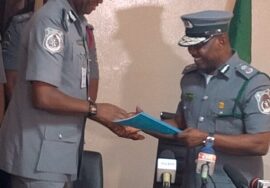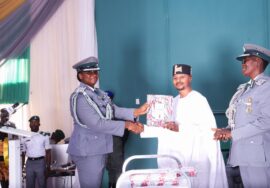
Customs Operations in the 21st Century: Key Insights from the 2024 Maritime Journalists Training Workshop
![]()
Customs Operations in the 21st Century: Key Insights from the 2024 Maritime Journalists Training Workshop
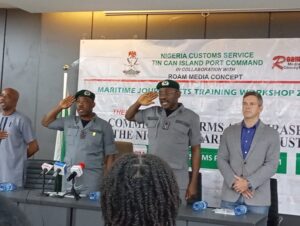
By Frank Odinukaeze
The Apapa Customs Command Auditorium was abuzz with activity as maritime journalists gathered for the 2024 Maritime Journalists Training Workshop. The event, aimed at enhancing the understanding of customs operations and their impact on international trade, featured a keynote presentation by Chief Superintendent of Customs Ibrahim Adeiza, representing the Customs Area Controller, Tincan Island Port Command, Comptroller Dera Nnadi mni.
In his presentation, titled ,”The Operating Environment: Commercial Terms and Phrases Used In The 21st -Century Customs Operations”,Chief Superintendent Adeiza highlighted the evolving nature of customs operations in the 21st century, influenced by globalization, technological advancements, and changing trade agreements. He emphasized the critical role of customs in facilitating international trade by regulating the movement of goods across borders.
Adeiza provided a historical overview, noting that customs operations have traditionally focused on tariff collection and compliance with national regulations. However, the rise of global trade networks, technological advancements, and challenges such as insecurity, global warming, terrorism, and the COVID-19 pandemic have expanded the scope of customs operations. This evolution has necessitated the adoption of precise language and terminology to mitigate legal disputes and streamline processes.
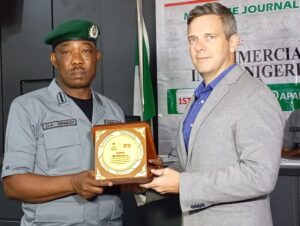
The presentation outlined several key terms and phrases commonly used in Nigerian customs operations:
NCS (Nigeria Customs Service): The government agency responsible for administering customs laws and enforcing trade regulations in Nigeria.
HS Code (Harmonized System Code): An internationally standardized system for classifying traded products.
BOL (Bill of Lading): A legal document between the shipper and carrier detailing the type, quantity, and destination of goods.
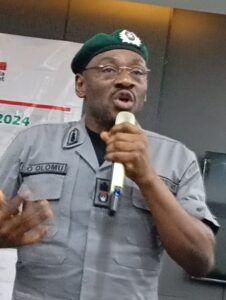
FOB (Free On Board): Indicates whether the seller or buyer is responsible for goods damaged or destroyed during shipping.
CIF (Cost, Insurance, and Freight): A shipping arrangement covering the costs of goods, insurance, and freight to a specified destination.
VAT (Value Added Tax): A consumption tax levied on goods and services at each production or distribution stage.
Customs Duty: The tax imposed on imported goods.
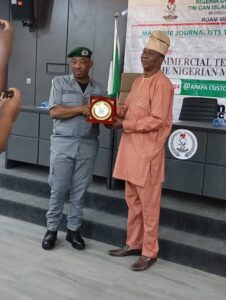
Long Room: Historically, a place where customs declarations were submitted by importers.
WTO (World Trade Organization): Regulates international trade and provides a framework for negotiating trade agreements.
Adeiza also discussed the importance of International Commercial Terms (Incoterms), established by the International Chamber of Commerce (ICC) in 1936. These terms define the responsibilities of buyers and sellers in international transactions, clarifying who is responsible for various costs and risks. Incoterms such as FOB and CIF play a significant role in customs operations by facilitating clearer communication, reducing disputes, and streamlining procedures.
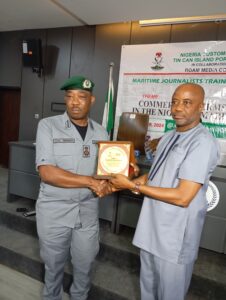
The workshop underscored the importance of understanding these terms for businesses engaged in global trade, highlighting how they contribute to more effective and efficient customs processes.
The well researched and articulated presentation had six parts ,with each part dealing with specific area of operation
part 6 of the paper ,deals on Future Trends.He said,
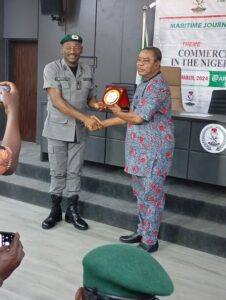
“Looking ahead, the terminology associated with customs operations is likely to continue evolving. Emerging concepts such as “sustainability compliance” may become more relevant as environmental concerns shape
trade policies. Moreover, as global trade dynamics shift, terms related to digital currencies and cross-border data flows may gain importance in customs discourse”
Conclusively,CSC Adeiza, submitted that,” The operating environment of customs operations in the 21st century is characterized by a complex interplay of terminology that reflects the ever evolving nature of global trade. Understanding these commercial terms and phrases is essential for all stakeholders involved in customs operations, from importers and exporters to customs authorities” He added that,”As the trading landscape continues to evolve and complexities arise, staying informed about emerging terminology and phrases will be crucial for navigating the challenges of international trade”
The Comptroller General of Customs, Comptroller Bashir Adewale Adeniyi MFR,stated the imperative of training Journalists to acquire necessary knowledge in current operating environment of the customs service,in order to give knowledge based reportage
Represented by erudite and knowledgeable Controller Tin can Island Port Command, NCS, Comptroller Dera Nnadi,the CGC advised participants to ensure full concentration during the training, remain focussed and dedicated so that the laudable objectives behind the programme would be achieved.
The Comptroller General who commended the organisers of the workshop in their quest to upgrading the professional skill of maritime journalists,for better service delivery,promised that the training would not just be a one- off thing , it would be a continuous exercise.
Delivering his own paper titled ,”The Operating Environment:Commercial Terms And Phrases Used by Shipping Companies/ Lines In Nigerian Ports”, Deputy Managing Director,Mediterranean Shipping Compao(MSC),Jacob iosso,noted that Nigerian export trade improved in 2024 ,when compared to 2023.
The Deputy Managing Director ,said over 40,000 Twenty foot Equivalent Units (TEUs) Nigerian agricultural produces were exported in the last 10 months.
iosso said that the figures would have risen, but for the natural disasters which ravaged some parts of the country affected the number of exports handled by the liner.
He said,In the past 12 months ,we have shipped out over 40,000 TEUs but I don’t have the exact number off-hand, but I know is over 40,000 “.
He further explained that the exported goods are mostly Soya Beans, Sesame seeds, Coco and other agricultural crops.
He noted that the Company being an international organisation ships consignments to all parts of the world.
On the issue of container deposit refunds,he said,” For you to get a refund on container deposit,you must return the container in tact, without damage and within the free period allowed”.
Earlier, in his welcome address, Chairman, Planning Committee of Maritime Journalists Training, Innocent Orok , said “Though, it has not been easy to put this event together due to the harsh economic realities of our polity. But is worth it, because truly speaking a lot have evolved in the maritime sector , especially new technologies and ICT based services, which the media must be abreast of, to properly educate, inform and set agenda for a productive sector”.
According to the Chief Executive Officer ,Roam Reporters Media,”It is pertinent to note that Maritime Journalists deserve training and empowerment.” adding that,“After all, journalism practice is for the good of the society.”
”This is just the first phase , as every practicing journalists will benefit from the subsequent editions. Let me state here that the intension of the initiator of this noble idea is for us the Maritime Journalists to take it, own it ,and institutionalize it as a yearly , twice yearly or quarterly training workshop”Orok said.
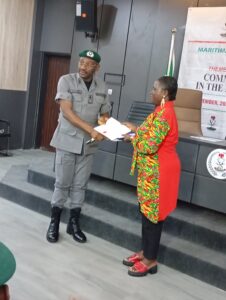
According To him,”A template has been set by someone who grew in ranks through the media . He loves the media and always working to see that maritime journalists of which he is part of moves to the next level”.
In a very short but significant remark,the Controller, Apapa Area Command, NCS, Comptroller Babatunde Olomu expressed deep satisfaction for the success of the maiden training programme for journalists,and also expressed satisfaction over the level of participants and the level of interaction by the media practitioners,echoing the initial CGC promise of a continuous excecise.
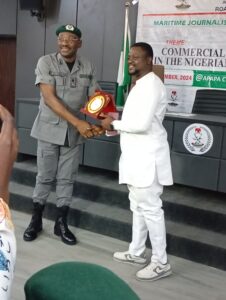
The 2024 Maritime Journalists Training Workshop provided valuable insights into the complexities of modern customs operations. Chief Superintendent Adeiza’s presentation emphasized the need for precise language and clear communication among stakeholders to navigate the evolving landscape of international trade. The event was a testament to the commitment of maritime professionals to advancing the industry through education and collaboration.
High point of the one day training programme for Maritime Journalists with the theme,”Commercial Terms And phrases In The Nigerian Marine Sector”, was the presentation of awards to the CGC of Customs ,Bashir Adewale Adeniyi,MFR, Comptroller Dera Nnadi, the Deputy Managing Director,MSC,Mr Jacob iosso,and Comptroller Babatunde Olomu.Others include veteran Journalists,Mr Dele Aderibigbe, Evangelist Mazi Ohakwe,Mr Sesan Onilemo,Mr BOLAJI Akinola, including the chairman of the training Committee ,Mr Innocent Orok amongst others.



